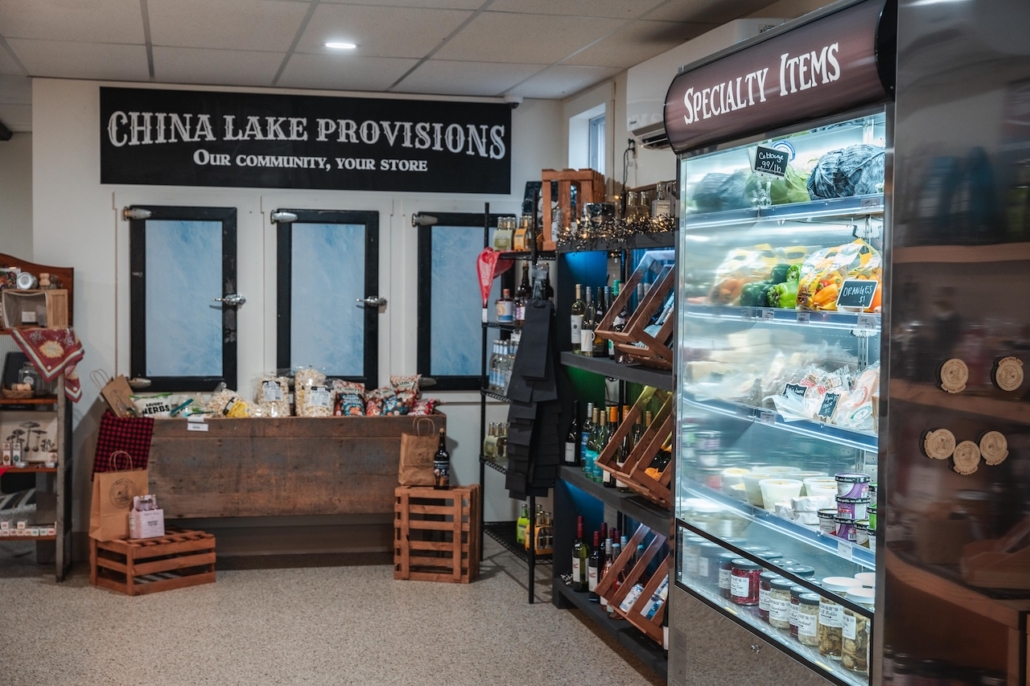China TIF committee hears reports from fund recipients
 by Mary Grow
by Mary Grow
At their Aug. 24 meeting, China’s Tax Increment Financing (TIF) Committee members heard reports from representatives of programs that have received TIF funds. The China Broadband Committee’s project has a 10-year, $30,000 a year allocation, approved by voters. The Thurston Park Committee, the China Region Lakes Alliance (CRLA) (and the China Lake Association [CLA], not represented Aug. 24) and the China Four Seasons Club apply annually.
Committee members also discussed briefly the proposed boundary survey of the nearly-unused town-owned boat launch in South China. Committee member Jamie Pitney said $15,000 was approved for the survey, recommended by Town Manager Rebecca Hapgood.
Once town officials know how much land they have, they can decide how to use it. Pitney said South China Volunteer Fire Department members want continued access to the lake. Public possibilities include restoring a small area for boat trailers (to take pressure off the often-crowded north end landing, TIF committee member Michael “Mickey” Wing said) or allowing only hand-carried canoes and kayaks.
Thurston Park Committee Chairman Jeanette Smith said the park is getting increasingly favorable reviews on on-line sites like AllTrails as roads are improved and maintained and especially since the installation of two solar-powered dehydrating outhouses that, she said, “do not smell.” Trails are suitable for bicyclists and horseback riders as well as hikers; they are open for winter use.
There is vehicle access to the pond on Yorktown Brook in the northwest, and this summer one of three Eagle Scout projects planned a picnic area near the canoe and kayak launch. The other Eagle projects were an improved Monument Trail to the stone marking the intersection of the Albion, China and Palermo town lines and a winter parking area by the entrance road from the north, Smith said.
The next project, already started, is a storage building for equipment and supplies.
CRLA Executive Director Scott Pierz summarized major ongoing programs.
- The Courtesy Boat Inspection Program, partly funded by Kennebec Water District, is aimed at keeping invasive plants out of China Lake.
- The state-wide LakeSmart program helps shorefront property-owners plan erosion control measures, like buffers, retaining walls and infiltration areas. Pierz said Fieldstone Gardens, in Vassalboro, has been helpful in recommending appropriate shoreline plants.
- Members of the Youth Conservation Corps, ably led in summer 2022 by Jack Blais, work with shorefront landowners to install erosion control features.
- The Gravel Road Rehabilitation Program works with individuals and groups responsible for fire roads to minimize road run-off into water bodies. Pierz said CRLA recently sent out nine requests for bids for work on Fire Road 37; two companies replied, and Pine Tree Waste’s bid of $19,160 was accepted, being more than $15,000 lower than the other bid. Pierz expects work to start in September.
Pierz plans to ask for more TIF money for 2023, and said CLA president Stephen Greene will probably apply on behalf of that organization. He reminded committee members that the updated watershed management plan recommends an expensive alum treatment to seal off phosphorus-rich bottom sediment in the north end of China Lake’s east basin
TIF Committee member James “JJ” Wentworth reported briefly on the Four Seasons Club’s 2022 trail work, mostly toward the southeastern part of town.
China Broadband Committee (CBC) Chairman Robert O’Connor explained the current proposal to work with UniTel, of Unity, Maine, and its owner, Direct Communications, of Idaho, (see the Aug. 25 issue of The Town Line, pages 2 and 3) to expand and improve internet access in China.
The plan, O’Connor said, is to fund a project estimated to cost close to $1.2 million without raising tax bills. The TIF will contribute $300,000 over 10 years; if voters approve on Nov. 8, China’s American Rescue Plan Act funds will add $70,000, for about 31 percent of the total; UniTel and Direct will contribute a matching amount, another 31 percent; and a state grant from the Maine Connectivity Authority (MCA) would cover the remaining about 38 percent.
MCA grants are available to extend service to unserved and underserved areas, where people have no or inadequate broadband access. O’Connor showed TIF committee members an updated map of the proposed backbone, new fiber lines that would deliver broadband first to grant-eligible areas and in later project phases to all interested residents.
“Here’s my big thing,” Wentworth said. “Tell me if I’m wrong.”
He said when he chose to live off a main road, he paid for electricity to be extended to his house. Why, he asked, should residents who chose to live at the end of camp roads or otherwise distant from main lines be given broadband access without charge?
What if you inherited an unserved house? Wing asked. Wentworth, envisioning it as lakefront property, said he’d sell it and “make a ton of money.” But, Trishea Story said, lack of internet access would reduce its value.
Committee chairman Brent Chesley added that town-wide internet service is intended partly to benefit current residents and more to attract new residents and especially new businesses, as envisioned in the TIF program.
Pitney said that modern fiber technology has capabilities current copper-wire technology lacks. UniTel will become a competitor to existing services, probably to the benefit of all customers. O’Connor added that fiber allows broadband to function when electrical power is interrupted, except when the tree that took down the power line also snapped the fiber cable.
Meanwhile, Wentworth said, UniTel will make a profit off new customers. Businesses should make profits, Wing retorted.
At the Aug. 22 select board meeting, no one knew when MCA grant applications would open. In an Aug. 25 email, O’Connor said first-round grants will be accepted beginning Sept. 10, with the deadline Nov. 9. CBC members will work with UniTel personnel and CBC consultants Mission Broadband to prepare an application.
TIF Committee members scheduled their next meeting for 6 p.m. Wednesday, Oct. 26.
Why China decided to create TIF
At the Aug. 24 Tax Increment Finance (TIF) Committee meeting, committee member Jamie Pitney reminded the group why China decided to put tax revenue from Central Maine Power Company’s major transmission line through town and its South China substation into a TIF. Otherwise, he said, the revenue would have gone into the tax base, making China richer compared to its neighbors and thereby increasing its county tax and decreasing its share of state funding under various programs.
State law allows, but does not require, municipal TIFs. If the town does not spend its TIF money, eventually state officials will require it be un-TIFed and added to the tax base, Pitney said. In recent years not all the income has been allocated, and not everything allocated has been spent.
Responsible journalism is hard work!
It is also expensive!
If you enjoy reading The Town Line and the good news we bring you each week, would you consider a donation to help us continue the work we’re doing?
The Town Line is a 501(c)(3) nonprofit private foundation, and all donations are tax deductible under the Internal Revenue Service code.
To help, please visit our online donation page or mail a check payable to The Town Line, PO Box 89, South China, ME 04358. Your contribution is appreciated!





Leave a Reply
Want to join the discussion?Feel free to contribute!